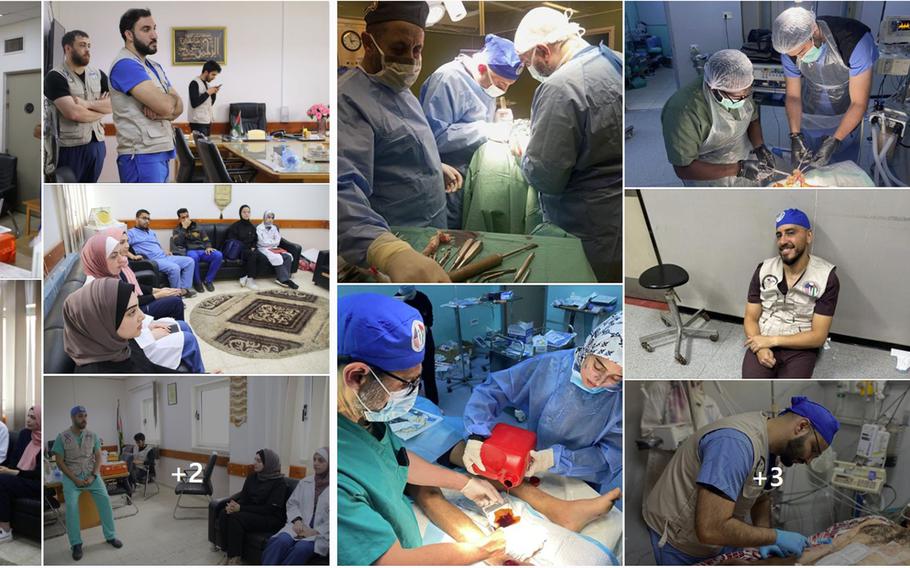
Screen grabs show medical personnel working at the European Hospital in Gaza. (Facebook/ PAMA)
Intensifying conflict in southern Gaza has trapped a team of international doctors, including at least 10 Americans, in a hospital near the city of Rafah, further jeopardizing conditions for both the aid workers and scores of their critically wounded Palestinian patients, medical personnel told The Washington Post.
The medical workers were due to leave Gaza on Monday after a two-week rotation in the European Hospital in Khan Younis, an area near Rafah. Doctors there said they are no longer certain when they can leave or if they can safely reach the border with Egypt. Israel on May 7 seized control of and closed the Rafah crossing, which was relied upon by aid organizations. On Monday morning, a U.N. staff member traveling to the European Hospital was killed when their vehicle — which was marked with a United Nations flag — was attacked.
“Right now we are stuck in Gaza,” Monica Johnston, a nurse who works at a burn trauma center in Oregon and is among the volunteers at the hospital, wrote to The Post. “No safe way to get out and no new help or supplies coming in.”
State Department spokesman Vedant Patel said at a news briefing Monday that U.S. officials are aware of reports of American medical staff trapped in Gaza and are working with the Israeli and Egyptian governments on the issue. The department did not immediately respond to additional questions from The Post about whether it was in contact with Americans in Gaza or their families. The doctors’ status was first reported by the Intercept.
Israel’s seizure of the Rafah border crossing last week severed a crucial supply line for organizations working to deliver humanitarian aid in Gaza. International medical volunteers working in Gaza hospitals said they relied on the crossing to get into and out of the conflict zone.
Some volunteers have described scenes of severe overstretch at hospitals in southern Gaza. Israeli bombardment has cut off ambulance access to some regions, a Palestinian Red Crescent spokeswoman said last week. Medical evacuees have been stranded at the Rafah border crossing, unable to reach help in Egypt. With hospitals shuttering across Gaza, a UNICEF spokesperson previously described the European Hospital as Rafah’s “last lifeline.”
Johnston and her colleagues entered Gaza on May 1. Some of them carried as many as eight suitcases to ferry additional medical supplies to the European Hospital, said Mahmoud Sabha, a Dallas-based doctor with the team.
The Palestinian American Medical Association, a Virginia-based nonprofit organization, announced in a news release late Monday that 19 of its health-care workers, including 10 U.S. citizens, are among the volunteers stranded at the hospital. Other health-care workers with the organization are from Jordan, Egypt and Australia, according to the news release.
Volunteers with FAJR Scientific, another nonprofit organization, are also working at the hospital, according to Sabha and the nonprofit’s social media. FAJR Scientific did not immediately respond to a request for comment.
The team has worked, under increasing exhaustion and burnout, in catastrophic conditions, doctors said. Patients arrive daily with severe burns and explosive injuries, and many are dying of survivable wounds because doctors don’t have the supplies or medication to keep them clean and prevent infections, Johnston said. Mohamad Abdelfattah, another doctor with the team who is from California, said thousands of people are taking refuge in the hospital, making it difficult to contain the spread of illnesses.
“As you walk through the corridors, there’s babies, there’s young children playing, there’s moms, there’s elderly,” Abdelfattah said. “And so they’re literally occupying every inch of the hospital.”
Almost the entire team of doctors also came down with stomach viruses and suffered from dehydration over the two-week rotation, Johnston said. She said she treated patients while hooked up to her own IV.
Uncertainty began to cloud the team’s plans to leave Gaza as Israeli forces advanced in Rafah. Monday’s deadly attack on a U.N. convoy — as well as previous attacks on aid workers in Gaza — cast a pall over the notion of even safely leaving the hospital, Johnston said.
“With the convoy incident today, we are extremely nervous about any promises made to us about safe passage,” she said on Monday.
The Palestinian American Medical Association is coordinating with the World Health Organization and a U.N. office to bring its team home, it said in its news release. It urged the U.S. government to assist in aiding its American team members.
The Intercept reported that State Department officials told some relatives of those trapped that a rescue effort was underway. Samaiya Mushtaq, Sabha’s wife who lives in Dallas, told The Post that she had not been contacted by the State Department but had heard that some families had mobilized to contact government officials.
When asked about the trapped volunteers, Patel, the State Department spokesman, said that the United States wants to see the Rafah border opened “as swiftly as possible.”
Doctors at the European Hospital stressed that they were most concerned about the disruption to aid organizations’ ability to maintain a regular rotation of volunteers and supplies to Gaza. Volunteers set to relieve the team at the European Hospital are stuck in Egypt, unable to cross the border, Johnston said. Sabha said he doesn’t want to leave the hospital until the other volunteers can enter Gaza.
“We want to leave when other health-care and humanitarian workers are able to get in,” Sabha said. “We do not want to leave these Palestinians to themselves.”
Miriam Berger contributed to this report.